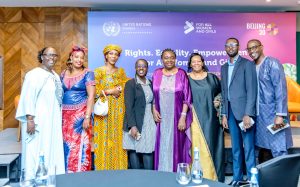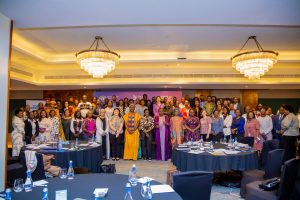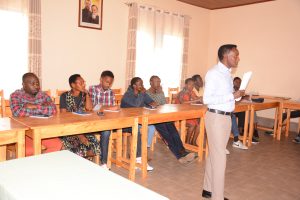 On March 25, 2025, United Nations Rwanda celebrated International Women’s Day. The entire UN team in Rwanda and their partners gathered around the theme “For all women and girls: Rights. Equality. Empowerment” – reflecting on the 30 years since the Beijing Declaration and renewing the commitment to accelerate gender equality.
On March 25, 2025, United Nations Rwanda celebrated International Women’s Day. The entire UN team in Rwanda and their partners gathered around the theme “For all women and girls: Rights. Equality. Empowerment” – reflecting on the 30 years since the Beijing Declaration and renewing the commitment to accelerate gender equality.
In her speech, Renata Tallarico, Deputy Representative of UNFPA Rwanda, urged collective action against the rolling back of women’s and girls’ rights.
“If we take progress for granted, we risk going backwards. The UN stands up for women, but real change happens when we do it ourselves,” she said.
All speakers noted that over the past three decades, Rwanda has made remarkable progress in key areas, including women’s political representation, economic inclusion, legal reforms and access to education and healthcare.
Despite significant advances concerning the invaluable contributions of women and girls in driving transformational change, there is no shortage of challenges around the world, such as gender-based violence, negative social norms, economic disparities and the digital divide persist, requiring renewed commitment and bold strategies. Hence, the synergy of partners to meet these challenges.
The theme of this year’s International Women’s Day is: “For ALL women and girls: Rights. Equality. Empowerment” is a powerful call to reaffirm commitments to women’s rights, the promotion of gender equality and the empowerment of women to realize their full potential. It calls for decisive action to remove persistent barriers and create a world where every woman and girl enjoys equal rights, opportunities and influence.
This year’s campaign focuses on young people, particularly young women and adolescent girls, as catalysts for sustainable societal change and a feminist future.
 In Rwanda, the national theme, “Empowered Women: A Stronger Nation” -Umugore Ni Uw’Agaciro! reinforces the country’s commitment to fostering the emergence of a new era of empowered women leaders.
In Rwanda, the national theme, “Empowered Women: A Stronger Nation” -Umugore Ni Uw’Agaciro! reinforces the country’s commitment to fostering the emergence of a new era of empowered women leaders.
For the United Nations system, gender equality is a human rights value, a development goal and a programming principle. The UN system in Rwanda has adopted a gender mainstreaming approach in all its policies and operations.
In this context, the UN system, under the leadership of the Group on Gender, Human Rights, Diversity and Inclusion (GHRDI), organised a joint UN event on the above-mentioned theme.
Ferdinand Ndayiragije, legal representative of the Forum pour la Mémoire Vigilante, FMV, took the opportunity to speak to some of the participants about the mental health programs and maternity processes developed by Dr Denis Kazungu, clinical psychologist and psychopathologist.
A graduate of the University of Mons and the Université Libre de Bruxelles in Belgium, Dr Denis is a clinical psychologist & psychopathologist, and also holds a Diploma in Human Rights. He is Director of research and medico-psychosocial services at FMV. He is interested in mental health problems and associated illnesses that escape medical diagnosis, with a particular focus on mental health and the maternity process.
FMV therefore proposes to “think about well-thought-out and elaborate prevention programs that take into account the challenges of the moment and the specificities of certain professions, and introduce an evaluation in the form of a regular check-up…”.
For Dr Denis KAZUNGU, an active member of FMV, this is a growing issue. For example, he says, in the USA, 57% of workers claim to be currently suffering from at least moderate burnout, 75% of women versus 58% of men, Finland more than 50% of the working population present symptoms of stress-anxiety, depressive states; pain, sleep disorders and 7% suffer from severe overwork. In Germany, depressive illnesses are responsible for almost 7% of early retirements, and work incapacity resulting from depression is around 2.5 times longer than that caused by other illnesses. In the UK, 3/10 of employees experience mental health problems, and 1/20 of workers are seriously affected each year.
In Canada, 70% of workers are concerned about psychological health and safety at work, and 40% of sick leave is linked to a mental health problem, representing a loss of over $51 billion. In Africa, 11% of 100,000 employees commit suicide, above the WHO average of 9%. This is a health issue that deserves special attention from governments and professional circles.
Solutions…
According to Dr Kazungu, the first step is to recognize that mental health in the workplace is an urgent issue, and to integrate it into the workplace. Profitability depends on it. We need qualified, experienced professionals who know how to use tools (internationally validated tests), because stress, depression, anxiety and burnout can be measured, enabling us to develop tailor-made programs.
 Of course, we need to think about well-thought-out and elaborate prevention programs that take into account current challenges and the specificities of certain professions, and introduce an evaluation in the form of a regular check-up (every year, for example) that enables us to integrate mechanisms such as therapeutic half-time, compulsory health breaks, etc.
Of course, we need to think about well-thought-out and elaborate prevention programs that take into account current challenges and the specificities of certain professions, and introduce an evaluation in the form of a regular check-up (every year, for example) that enables us to integrate mechanisms such as therapeutic half-time, compulsory health breaks, etc.
Finally, the lack of regular interaction between different institutions, stakeholders and professionals (doctors, mental health professionals) is a challenge. This would help to establish a common understanding of certain challenges and overcome individual limitations.
According to the World Health Organization, it is vital that public authorities, employers, organizations representing workers and employers, and other stakeholders responsible for occupational health and safety, work together to improve mental health in the workplace.
